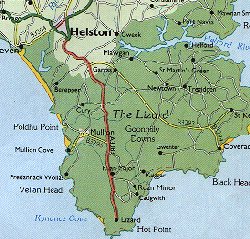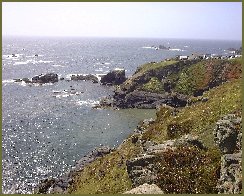
The Lizard.
The name given to the whole peninsula and the village comes from the Cornish for "Court on a height". It is Britain's most southerly point on the mainland and one of the few places where the decorative rock Serpentine can be found. It is called Serpentine because when polished or wet it resembles the skin of a snake.
|
Most of the peninsula has been declared as a site of special scientific interest or is owned by the National Trust and as a result it has remained mostly unchanged and unspoilt. Many geologists believe that it is an "ophiolite", a piece of ocean floor which has been forced up during volcanic activity. Many tourists only drive to the Lizard point but it is well worth exploring the fishing villages, coves and beaches. It was from a spot near Poldhu Cove that Marconi made his first trans-atlantic radio transmission from. A monument marks the spot. The seas around the coast are some of the most dangerous in Britain and over the years have resulted in the wrecking of score of ships both large and small. The Manacles a group of rocks on the eastern coast are reputed by locals to give off emissions which affect the compasses of ships. |
|
|
In the summer many people walk part of the coastal path around the Lizard and take in the stark beauty of the cliffs and coves. The centre area of the peninsula has poor soil and is covered with Cornish heath, western gorse, bell heather and several rare species of plants which over the years become even more rare as the unenlightened tend to disturb them. This is the type of place that is quiet and tranquil away from the busier tourist spots with a surprise round every corner of the narrow lanes. Click to enlarge |
Places to visit : Poldhu, Mullion. Church Cove, Kynance Cove, Lizard Point, Cadgwith, Coverack, Porthhowstock and St Keverne.

